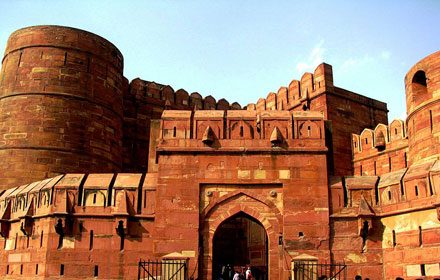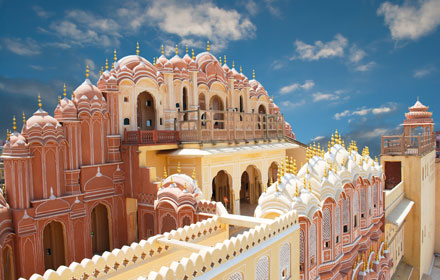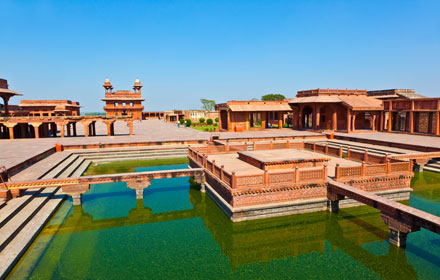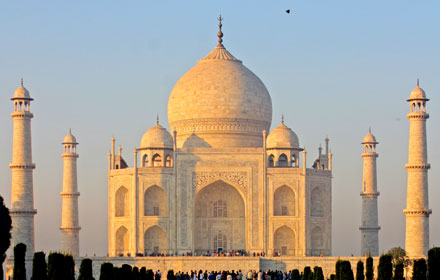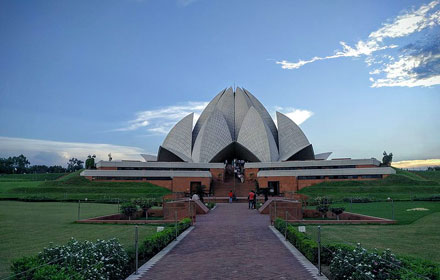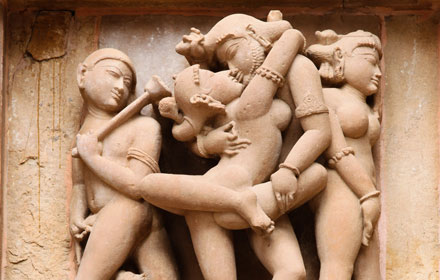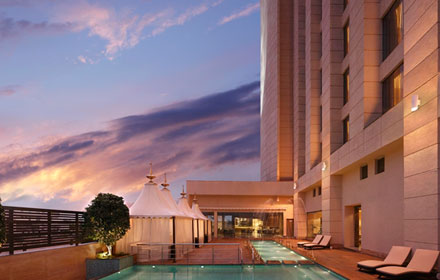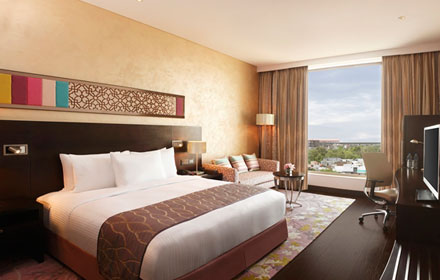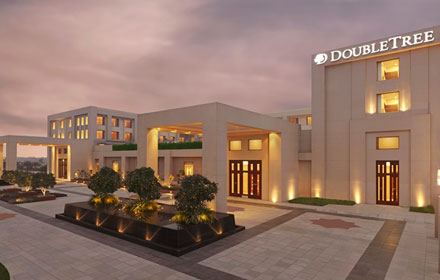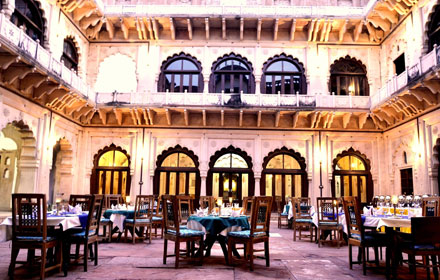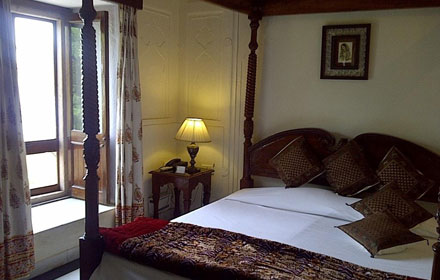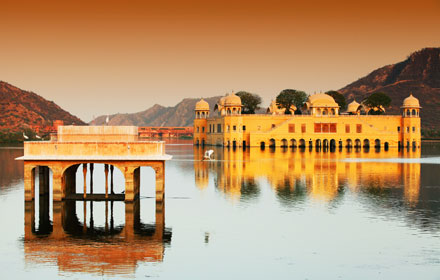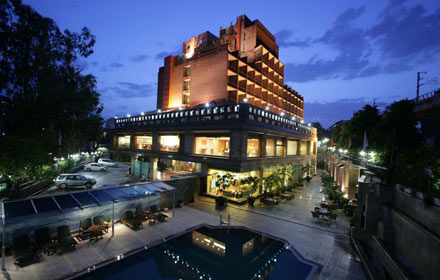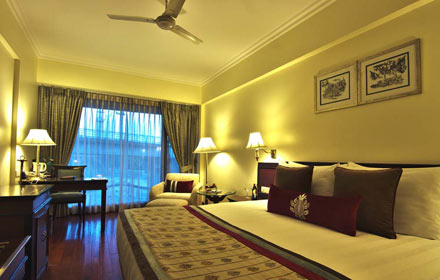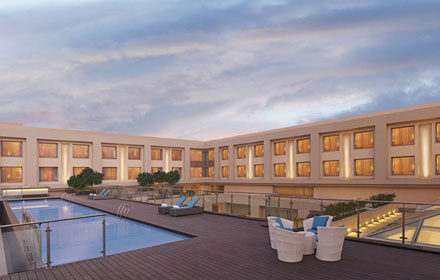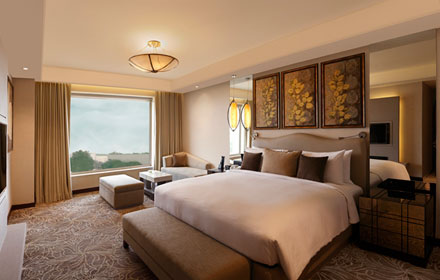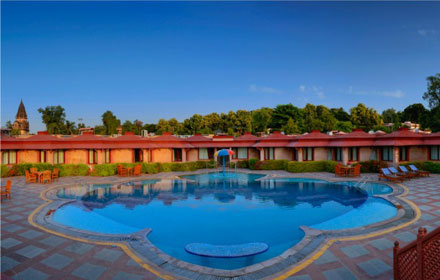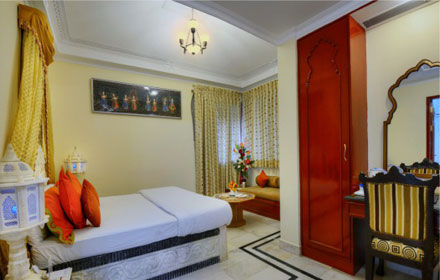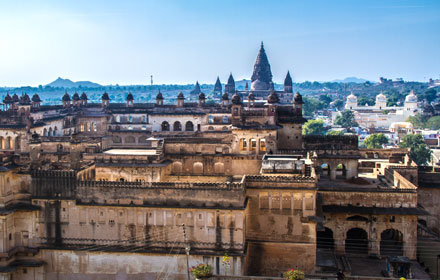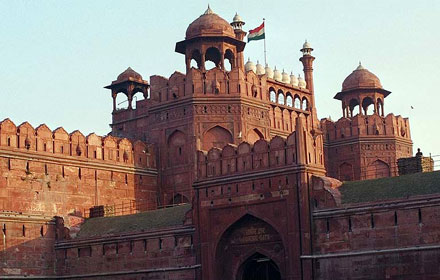Golden Triangle with Khajuraho

from £1450
from £1290 Per Person
11 Nights / 12 Days
Travel throughout beautiful cultural India, city full with diversity with different taste and explore some world famous attraction including Taj, Khajuraho Temple complex, Bhangarh ruins.
Inclusions:
- Overview
- Itinerary
- Hotels
- Exclusions
- Extras
Overview
Travel throughout beautiful cultural India, city full with diversity with different taste. Explore some world famous attraction including Taj, Khajuraho Temple complex and some interesting point like Bhangarh ruins. This tour includes all aspects of Indian life and represents past and present cultural, rural and beautiful Royal India.
Best of India catered with diversity and explore wonders like Tajmahal, City of Maharaja Jaipur, oldest living city and seat of culture like Varanasi and great structures of Khajuraho. This combination of enchanting destinations however, displays the richness of India’s history, heritage, rural and culture very beautifully in shortest time possible with value of money.
In this tour you are visiting:-
Delhi: Delhi is the best place to experience all that brings people to India: history, culture, food, spirituality, madness, mystery. Spend a day amid its lived-in splendor and you’ll realize why so many battles have been fought over it. Here are the extremes that make India so compelling.
Jaipur: At the heart of Jaipur lies the Pink City, the old walled quarter, whose bazaars rank among the most vibrant in Asia, renowned for their textiles, jewellery and Rajasthani handicrafts. For all its colour, however, the city’s modern outlook and commercial hustle and bustle offer a stimulating contrast to many other places in the state.
Bharatpur: Bharatpur is also home to one of the world’s best-known bird watching destinations, Keoladeo Ghana National Park (KNP). 250 years ago, the then ruler built embankments that allowed flooding of this land, turning it into a marsh.
Agra: The splendour of Agra – India’s capital under the Mughals – remains undiminished, from the massive fort to the magnificent Taj Mahal. You can go shopping for designer marble statues and marble carved stones which is also why Agra is famous for.
Gwalior: Gwalior is northern Madhya Pradesh’s largest city and boasts one of India’s most magnificent hilltop forts.
Orchha: Its tumbledown state, the fortified and now deserted medieval town remains an architectural gem, its guano-splashed temple shikharas, derelict palaces, havelis and weed-choked sandstone cenotaphs floating serenely above the banks of the River Betwa. Clustered around the foot of the exotic ruins, the sleepy village makes an excellent spot to unwind after the hassle of northern cities.
Khajuraho: The resplendent Hindu temples of Khajuraho, immaculately restored after almost a millennium of abandonment and neglect and now a UNESCO World Heritage Site, are an essential stop on any itinerary of India’s historic monuments. Famed for the delicate sensuality – and forthright eroticism – of their sculpture, they were built between the tenth and twelfth centuries AD and remain the greatest architectural achievement of the Chandella dynasty.
Other enroute Highlights :
Bhangarh Castle ruins: Believe most haunted palace in the world.
Abhaneri: An Old, beautiful but stunning step well with historic and culturally importance.
Kakanath Math Temple: A historic Temple without joints.
Bateshwar group of Temple: Newly discovered but old cluster of Temple group.
Sonagiri Hills: A beautiful hill with hundred clusters of Temples.
Datia Palace: An unexplored fort of India.
Inclusions
- Return Flight from London to Delhi
- Accommodation in hotel as per chosen category
- Meal as mentioned
- All transfer and sightseeing as per itinerary
- Guide at Monuments
- Rikshaw ride at Delhi
- Elephant ride at Jaipur
- Bird Sanctuary visit by Rikshaw at Bharatpur
- Tonga ride at Agra
Village Safari by Jugard
Itinerary
Day 1
Fly from London to Delhi.
Day 2
Arrival Delhi
On arrival meet and greet at airport and proceed to Jaipur. On arrival Jaipur, check into hotel. Evening visit local market on tuktuk, do some shopping and enjoy streets of Pink city or rest at hotel. Overnight at Hotel.
Meal: No Meal
Day 3
Jaipur
After breakfast, enjoy the guided sightseeing tour of the pink city built by Maharaja Jai Singh, the notable astronomer 260 years ago. Here the past comes alive in magnificent forts and palaces, blushed pink, where once lived the Maharajas. Jaipur was and still remains the only city in the world symbolising the nine divisions of the universe, through nice rectangular sectors sub-dividing it. It is a royal city and its surroundings are rather like an endless museum. The delightfully laid out gardens and parks, attractive monuments and marvellous heritage hotels, which were once the residence of Maharaja’s are worthy of admiration. This fascinating city with its romantic charm takes you to a feel of royalty and tradition and has plenty of forts and monuments that remind you of the ancient glamour, glory and charm of Rajput rulers. Take an excursion to Amber Fort; add a magical touch to the visit by riding on the back of an elephant from the foot of the hill up to the gates of the fortress in the manner of former kings and queens. Within the complex, Ganesh Pol, an imposing gateway painted with images of the elephant-headed god, Ganesh takes pride of the place. Also a part of the complex is the Diwan-I-Aam (Hall of the Public audience) with its spectacular display of pillars. Later visit the Maharaja’s City Palace, the home of the erstwhile royal family, the Observatory, Hawa Mahal also known as Wind Palace built in 1799 by Maharaja Sawai Pratap Singh and drive past the old part of Jaipur city. Rest of the day is at leisure. Overnight at Hotel.
Meal: Breakfast
Day 4
Jaipur–Bharatpur
After breakfast, proceed to Bharatpur. Enroute visit beautiful and world’s most haunted place Bhangarh’s castle ruins. The town was established in 1573 (VS 1631) during the rule of Kachwaha Rajput ruler of Jaipur Bhagwant Das as the residence of his second son Madho Singh. The next ruler of Bhangarh was his son Chhatra Singh. Bhangarh is also a pre-historic site. The most remarkable of its buildings are the Hindu Mandir of Gopinath, Shiv (Someshwar), Hanuman, Ganesh, Vishal Devta, Lavina Devi and Keshav Rai. Here Govt. of India placed official board to warn tourist not to stay after 5 pm. Later proceed to Abhaneri. Abhaneri was originally named Abha Nagri, which means "city of brightness," but due to mispronunciation, the name was changed. Abhaneri is prominent for ’Baoris’, step wells which were invented by the natives to harvest rain water. These tanks were used as cool places of retreat and as water reservoirs during parched times of the year. Chand Baori is the most popular and beautiful of the wells in the region and it is one of India’s deepest and largest. It was a ritual to wash the hands and feet at the well before visiting the adjoining “Harsha Mata Temple” dedicated to the goddess Harshat Mata. Harshat Mata is considered to be the goddess of joy and happiness. According to myth, the goddess is always cheerful and she imparts her joy and happiness to the whole village. Later proceed to Bharatpur. Upon arrival check in at hotel. Bharatpur - a hunting place of Maharaja of Bharatpur, later converted into a beautiful bird sanctuary where you can see more than 100 of species of birds and other more animal in their natural inhabitant. Explore the bird sanctuary by Rikshaw along with local guide for 2 hrs. Overnight at Hotel.
Meal: Breakfast
Day 5
Bharatpur–Agra
Have a leisurely breakfast and proceed to Agra enroute visit Fatehpur Sikri. One enters Sikri from the Agra Gate, one of the nine gateways on the way to the palace complex. Diwan-i-Aam or the hall of public audience appears first. It is a huge rectangular walled-in courtyard where petitions were heard, proclamations made, ambassadors received and entertainment programme held. Ponder the mysterious desertion of this capital city that was dramatically abandoned a few years after it was built. Though over 400 years old, Fatehpur Sikri is perfectly preserved. Reach Agra and check in at hotel. Later visit Agra Fort; on the west bank of the Yamuna River Akbar’s (the third of the Great Mughal) magnificent Fort dominates the center of the city. Akbar erected the walls, gates and the first building inside, Shah Jahan built the impressive imperial quarters and mosque, while Aurangazeb (the sixth and last of the Great Moghuls) added the outer ramparts. The Predominantly red sand stone structures combining Hindu and Islamic styles of architecture.
Evening visit Taj Mahal during Sunset. The Taj Mahal was built by an emperor in memory of his beloved queen. Construction of the Taj Mahal began in 1631 and is believed to have taken 18 years to complete with over 20,000 craftsmen working around the clock. The design and construction is said to be that of the legendary architect, Ustad Ahamad Lahori. Legend has it that once construction was completed, Shah Jahan had Lahori’’s hands cut off and blinded, so he would never be able to duplicate the structure. What makes Taj Mahal unique is its perfect proportions, distinct femininity, medium of construction and ornamentation. Its marble exterior reflects rose and golden tints at sunrise and sunset, while it is dazzling white during the day. Overnight at Hotel.
Meal: Breakfast
Day 6
Agra–Gwalior
Morning breakfast and proceed to Gwalior. Enroute visit Kakanmath Temple; recorded to have been built by Kachchhapaghata ruler Kirttiraja (A.D. 1015-1035), is a magnificent edifice even in its ruins and is remarkable for its sculptural wealth. Visit Bateshwar group of temple; were built much before the creation of Khajuraho Temples. Bateshwar Temples were constructed during 8th to 11th century by the Kings of Gurjara-Pratihara Dynasty. It is a group of 200 temples structure situated in beautifully countryside. Reach Gwalior and check in to hotel. Afternoon visit Jai Vilas Palace; Jai Vilas Palace was constructed by Maharaja Jayaji Rao Scindia in 1874 at a cost of Rs. 1 crore. It is a fine example of European architecture, designed and built by Sir Michael Filose. Evening visit magnificent Gwalior fort: known to be a biggest fort in the country. Even it is said that Mughal Emperor Babur quoted about this palace that – “the pearl in the necklace of the forts of Hind”. Overnight at Hotel.
Meal: Breakfast
Day 7
Gwalior–Orchha
After a leisurely breakfast, check out and before proceed to Orchha, visit Sonagiri hill temple complex; this is the unique place known as Laghu Sammed Shikhar covering the area of 132 acres of two hills. There are 77 beautiful Jain temples with sky high spires and pure natural environment pleasing to eyes & mind. Enroute visit Datia Palace; The specialty of this palace is that it is of 7 floor. However neither member from the royal family did ever lived here. The founder of the Datia State in Bundelkhand - Maharaj Birsingh Deo build many such 52 monuments all around the Country India. Datia’s Palace or the Satkhanda Palace is also called Datia Mahal. Later proceed to Orchha; the historic town of Madhya Pradesh, attracts travellers from around the world. Upon arrival, check in at hotel. Later visit Orchha. The town has its history dating back to 1501, when Rudra Pratap Singh established it. Betwa River bubbles and meanders through this town. Its remnants draw a picture of the past that inspires its visitors to know more about the legends and stories. Temples, Chattris, palaces and many such archaeological marvels are strewn around the locale. Overnight at Hotel.
Meal: Breakfast
Day 8
Orchha–Khajuraho
After a leisurely breakfast, check out and proceed to Khajuraho. Upon arrival check in at hotel. The Khajuraho Group of Monuments is a group of Hindu and Jain temples and are one of the UNESCO World Heritage Sites in India. The temples are famous for their nagara-style architectural symbolism and their erotic sculptures. Most Khajuraho temples were built between 950 and 1050 by the Chandela dynasty. Afternoon visit the world famous Khajuraho temples constructed over a span of 100 years, between 950 and 1050 A.D. These temples are considered the "high point" of Indian architectural genius in the medieval period. Life, in every form and mood, has been captured on these stones. Today out of the original 85 temples, only 22 have survived the ravages of time. These temples are a fine example and have gained popularity due to their salacious depiction of traditional way of life during the medieval times. Overnight at Hotel.
Meal: Breakfast
Day 9
Khajuraho–Delhi (Overnight train)
Morning breakfast and day at leisure till transfer to railway station to board overnight train for Delhi. Overnight on Board.
Meal: Breakfast
Day 10
Arr Delhi
On arrival transfer to hotel. Explore Delhi by own in busy markets and walk around local streets. Overnight at Hotel.
Meal: Breakfast
Day 11
Delhi
Breakfast and proceed for Old Delhi sightseeing, feel real representation of Old Delhi with narrow lanes, traditional people, colourfull market, lot of smiley face with different religion and tradition at one place which represent equality in difference. Witness of Old Delhi daily routine life, enjoy Rickshaw ride with this old heritage and tradition. Visit Jama masjid - one of largest mosque of India where twenty five thousand people can pray at one time. Drive pass through red fort which is almost same as compare to Agra fort. Also visit world leader Mahatama Gandhi’s memorial. Afternoon you will be taken to see the “New Delhi” which came into existence much later and is also known as Lutyens Delhi, taking after the name of a British architect who was largely responsible in designing India Gate, Presidential House, Secretariat, Parliament House and many other buildings in that area. Visit the recent jewel in the crown "Lotus Temple" and then drive on to see the tallest tower in Delhi, known as Qutub Minar, which declared the arrival and rise of Islam in India. Visit Qutub Minar – the great monument of Delhi was built by Qutubuddin Aibek. Overnight at Hotel.
Meal: Breakfast
Day 12
Delhi–Departure
After breakfast transfer to Delhi airport enabling you to board the flight for your onward journey.
Meal: Breakfast
*GALA DINNER SUPPLEMENT FOR 24TH AND 31ST DEC IS EXTRA AND ADVISABLE AT THE TIME OF BOOKING.
*Rates are Per person with minimum 2 pax travelling together.
Hotels Details

Piccadily Hotel or Similar - New Delhi

Centre Complex Block A1, Janakpuri District Center, Janakpuri, New Delhi, Delhi 110058
An upscale business-cum leisure property, The Piccadily New Delhi is a spacious, well-appointed hotel with iconic rooms, specialty restaurants, a 24-hour Business Centre, an outdoor pool, a spa and Fitness by Precor®zone, catering to discerning business and leisure travelers in the bustling West Delhi region.
Experience hospitality at its best at this premier luxury and business hotel in Janakpuri, located just 18 kilometers from the airport. The Piccadily, New Delhi is located in the west of New Delhi at Janakpuri, in the heart of the local trading and public sector community and Indira Gandhi International Airport and benefits from easy access to the main commercial, business and entertainment districts of Connaught Place and Gurgaon.
Most Popular Facilities
- Swimming Pool
- WiFi
- Free Parking
- Fitness Center
- Serena Spa
- Bar
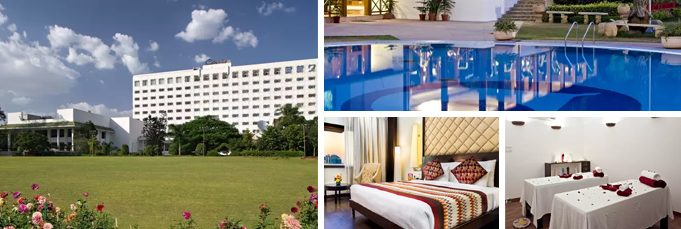
Hotel Clarks Amer or Similar - Jaipur

Jawahar Lal Nehru Marg, Near Jawahar Circle, Opp. Fortis Hospital, Jaipur, Rajasthan 302017
Clarks Amer Jaipur is India’s first ISO 9001:2000 accredited hotel by QSI, USA. This Jaipur Business Hotel has also attained ISO 14001:2004. Clarks Amer Jaipur is situated in a green residential area, in the heart of the city and is credited as Rajasthan’s first five-star hotel. The hotel is situated at a distance of 2.5 kilometres from the airport and 12 kilometres from the railway station.
Most Popular Facilities
- Swimming Pool
- Gym
- Spa Facility
- Restaurant
- Free parking
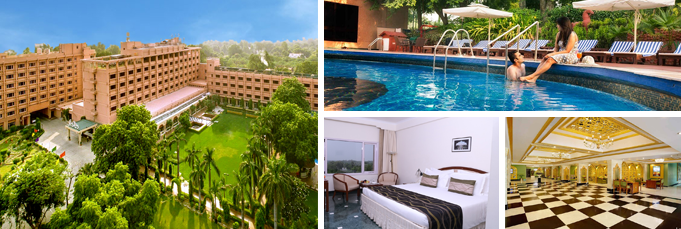
Hotel Clarks Shiraz or Similar - Agra

54, Taj Rd, Agra Cantt, Idgah Colony, Agra, Uttar Pradesh 282001
Clarks Shiraz, Agra, is a five-star luxury hotel which combines business with pleasure, style with substance, form with function.
Located 2 km. from the Taj Mahal, in the heart of Agra, and yet free from its din and bustle, The Clarks Shiraz is just 7 km. from the Airport and 3 km. from the Railway Station.
Most Popular Facilities
- Swimming pool
- WiFi
- 24 hrs Room Service
- Travel Desk
- Satelite Channels
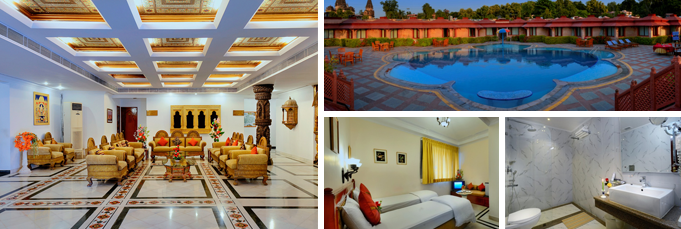
Orchha Resort or Similar - Orchha
Abad Kanchanghat, Distt. Tikamgarh, Orchha, Madhya Pradesh 472246
Situated on the banks of river Betwa, about 18 Kms from Jhansi railway station, ’Orchha Resort’ is located in a calm and serene zero polluted area. Completely away from the hustle –bustle of town . It is well connected by road and train from Delhi , Agra , Gwalior , Kanpur , Lucknow & Khajuraho. Acknowledged as one of the India’s finest resort, no details over-looked, no luxury underplayed. With Well decorated 32 rooms we provide all international amenities and facilities. ’Kaleva" – the restaurant offers mouth watering Indian, Chinese & Continental cuisine. The lounge bar offers a variety of mocktails and cocktails. Drinks can also be enjoyed at the poolside. It also has a Spa which offers Kerala Ayurveda massages with steam bath. A small meeting or training session can be organized in the board room which is fully equipped with all conference facilities.
Most Popular Facilities
- Outdoor Swimming Pool
- High Speed Internet
- Free Parking
- Air Conditioned
- Ayurveda & Spa
- Fitness Centre

Mahal Khas Palace or Similar - Bharatpur
Lohagarh Fort, Bharatpur,, Rajasthan 321001
Royalty and splendor goes hand in hand and Mahal Khas Palace stands tall with pleasure helping this widely known saying. Being known for as the paramount Accommodation in Bharatpur, this impeccable palace is best amalgamation of Mughal Architecture and Rich lavish fashion of dwelling of Jat rulers of yester years. A glance at this majestic lodge takes your reminiscence lane returned to the golden days of the yore.
Most Popular Facilities
- Free WiFi
- Bar
- Free parking
Cost of Package does not include
- Personal Expenses such as Laundry, telephone calls, tips, Liquor, boating & joy rides.(which is not mentioned in inclusion list)
- Any other item not specified in “Cost Includes”.
- Additional sightseeing or usages of vehicle not mentioned in the itinerary.
Extra Meal Supplement (Optional)
Half Board meal supplement £ 130 Per Person
Full Board meal supplement £ 250 Per Person
You May Also Like

PackAndFly
Book with £ 50 Deposit*PackAndFly
Book with £ 50 Deposit*You will receive a call from 0203 475 0009
Thank you,
Team PackAndFly

Pay Online
All bookings are subject to a booking fee of 1%.
Please Note :
Booking has to be reserved with our Sales Agent prior to making payment through the pay online link. For any reason if we are unable to confirm the same booking, we reserve the right to process refund. After successful payment please drop a email to the concerned agent with the payment details enabling us to process the booking.

